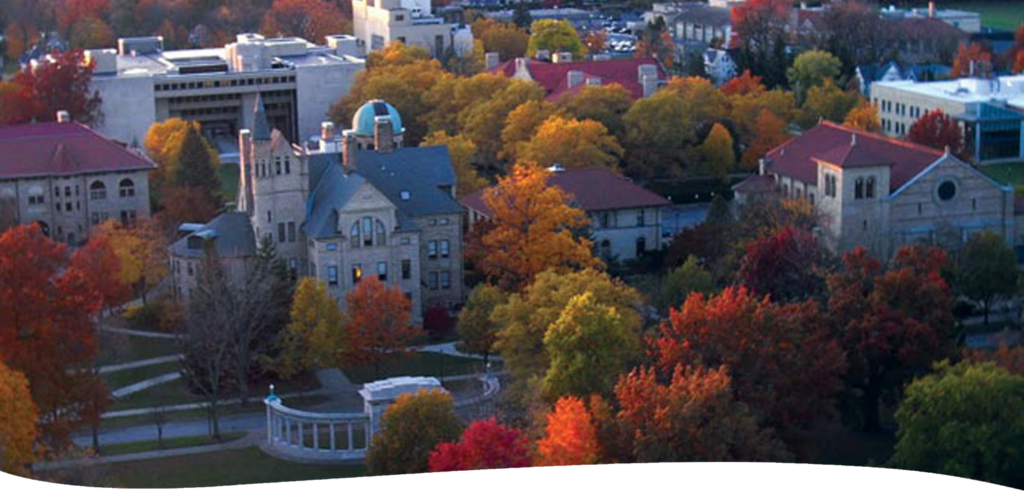
Carbon Neutrality at Oberlin College
Oberlin College has initiated a bold energy project to achieve carbon neutrality by 2025 by upgrading the century-old heating infrastructure serving its campus to a hot water system. This work will enable a large-scale geothermal and heat pumps system, add cooling to buildings, and implement other building improvements that will increase student and faculty comfort year-round. Ever-Green led carbon neutrality planning, led the design and planning process, serves as the owner’s representative in implementation, and is operating, maintaining, and managing the new system.
Study, Planning, & Implementation
Geothermal was identified as the preferred strategy to reduce the carbon profile of the campus’ thermal load, although biomass, biogas, and waste heat recovery from an adjacent landfill gas electricity generation station were also determined to be financially feasible and implementable.
In 2019, Ever-Green began leading the implementation of the program with an emphasis on converting the campus from steam to hot water, expanding the chilled water system on campus, installing a comprehensive fiber network, expanding fire protection systems, upgrading electrical systems, and modernizing campus buildings. Construction is scheduled over four years with work concentrated during the summer of each year. The central plant will simultaneously supply steam, hot water, and chilled water through project completion. Buildings that are fully converted to the new system are expected to be 30 percent more efficient, and these buildings will have local controls for greater occupancy comfort.
Ever-Green also is serving as Oberlin’s owner’s representative, leading the implementation of the planning recommendations, which includes design of the campus conversion from steam to hot water, verification of the optimal carbon-free energy supply strategies, utility organizational planning, development of financing strategies, and continued campus and community engagement. Ever-Green developed the supporting documentation of carbon and financial savings that helped Oberlin to receive Certified Climate Green Bonds. Ever-Green is operating and managing the updated campus energy system.
Read more on Oberlin’s Carbon Neutrality website.
Ever-Green’s Role
Ever-Green began its partnership with Oberlin College in 2015, working toward meeting Oberlin’s 2025 goal. Ever-Green led the Carbon Neutrality Implementation Plan for the Oberlin campus with an emphasis on energy and water utilities. Efforts included data collection, identification of building energy efficiency opportunities, exploration of renewable energy source options, development of financial strategies, and community and campus engagement. Oberlin was committed to finding a solution that was implementable and financially pragmatic that could result in substantial and permanent carbon reductions across campus.
Beginning in 2019, Ever-Green led implementation of the planning recommendations, which included design of the campus conversion from steam to hot water, verification of the optimal carbon-free energy supply strategies, utility organizational planning, development of financing strategies, and continued campus and community engagement.
Through construction, Ever-Green is serving as the owner’s representative and providing engineering expertise. The team also supports academic enrichment, stakeholder engagement, and project communications. Ever-Green’s planning helped to document the project’s alignment with the goals and targets of the Paris Climate Agreement, securing Certified Climate Bonds funding. This is only the second Certified Climate Bond offering among US colleges and universities, and third in the world.
About the Client
Oberlin College is a four-year liberal arts college and conservatory of music with a reputation for leadership in campus sustainability. Oberlin’s Office of Environmental Sustainability takes a multidisciplinary approach to advancing sustainability for campus and community resilience.
From the Oberlin website:
“Since the first greenhouse gas inventory in 2007, the college has halved on-campus emissions through the purchase of green electricity, installation of a 2.27 MW solar array, energy efficiency projects, and ending the use of coal for heating.” Oberlin is committed to being a carbon neutral campus by 2025.
Stakeholder Engagement
Throughout the study and planning phase, the Oberlin team worked closely with Ever-Green to solicit input from students, faculty, staff, and community partners, including the City of Oberlin, and local civic, business, and community groups. It is a priority of the project team to interact with a broad group of perspectives and to learn from the local experts who understand and have a significant stake in the outcomes of this effort.
In construction, Ever-Green supports Oberlin’s stakeholder engagement through community and campus forums, academic integration, intern management, tours, and project communication. The team collaborated with the geology department on a program featuring the geothermal system as a key learning opportunity. Student interns are gaining real-world experience while providing project support in the areas of student outreach, video development, GIS mapping, and energy system operation information.

